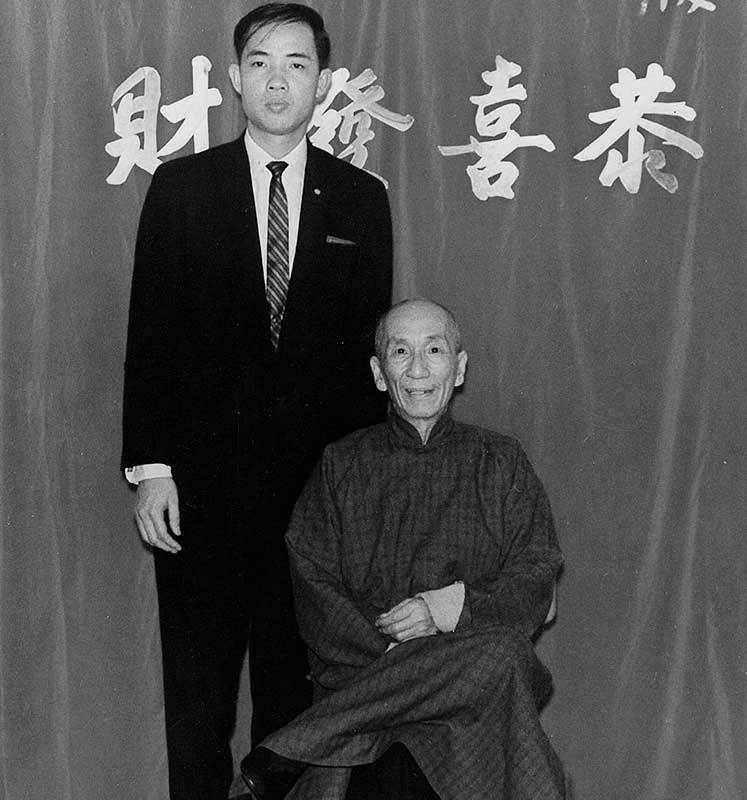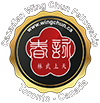About YIp Man
Ip Man, was a Chinese martial artist of Canton ancestry, and a master teacher of Wing Chun Kung Fu. He had several students who later became martial arts masters in their own right. His most famous student was Bruce Lee.

Yip Man and his diciple Moy Yat
About Yip Man
Who was Yip Man.
When Yip Man was thirteen years old he started learning Wing Chun from Chan Wah-shun. Because of his sifu’s old age, Yip Man had to learn much of his skills and techniques from his master’s second eldest disciple Ng Chung-sok. Three years into Yip Man’s training Chan Wah-shun died. One of his dying wishes was to have Ng continue training Yip. At the age of 15 Yip man moved to Hong Kong with help from Leung Fut Ting, a relative.
At age sixteen, Yip Man attended school at St. Stephen’s College in Hong Kong. It was a secondary school for wealthy families and foreigners who lived in Hong Kong. According to Yip Man’s two sons, while at St. Stephen’s Yip Man intervened after seeing a foreign police officer beating a woman. The story goes that the Police officer tried to strike Yip Man who used his martial arts to strike the officer down, at which point Yip Man and his classmate ran to school. The classmate is said to have told an older man who lived in his apartment block. Yip Man was invited to see this man and the man asked Yip Man what martial art he studied. The man then asked Yip Man to show him his first 2 forms (Sil Lim Tao and Chum Kiu). The man then told Yip man that his forms were “not too great.” Yip Man was then invited to Chi Sau (a form of training that involves controlled attack and defence), Yip Man saw this as an opportunity to prove his Kung Fu was good, but he was beaten after just a few strikes.
Yip Man closeup turned out that the old man was his master’s elder fellow-disciple (and so, by Chinese tradition Yip Man’s martial uncle), Leung Bik, son of his master’s master Leung Jan. After that encounter, Yip Man continued his training lessons from Leung Bik. By the age of 24, Yip Man had returned to Foshan, his Wing Chun skills tremendously improved. In Foshan, Yip Man became a policeman. He did not formally run a Wing Chun school, but taught several of his subordinates, his friends and relatives.
Amongst those informal students, Lok Yiu, Chow Kwong-yue, Kwok Fu, Lun Kai, Chan Chi-sun and Lui Ying were amongst the most well-known. Chow Kwong-yue was said to be the best student among his peers, but eventually he went into commerce and dropped out of martial arts all together. Kwok Fu and Lun Kai went on to teach students of their own. Wing Chun in the Foshan and Guangdong area was mainly passed down from these two individuals. Chan Chi-sun died young, and Lui Ying went to Hong Kong. Neither of them took any students.
Yip Man went to Kwok Fu’s village house during the Japanese Occupation. He only returned to Foshan after the war, to once again take up the job of a police officer. At the end of 1949, after the Communist party won the Chinese civil war, being an officer of the Kuomintang, he decided to escape to Hong Kong without his family when the Communists had come to Foshan.
In Hong Kong, he opened a martial arts school. Initially, business was poor because his students typically stayed for only a couple of months. He moved his school twice, to Hoi Tan Street in Sham Shui Po, and then to Lee Tat Street in Yau Ma Tei. By then, some of his students were skilled enough that they were able to start their own schools. Among the many students that started teaching were Leung Sheung, Lok Yiu, Chu Shong-tin, Wong Shun Leung and Lo Man Kam and Moy Yat.
Some of Yip Man’s students and descendants compared their skills with other martial artists in combat. Their victories over other martial artists helped to bolster Yip Man’s reputation as a teacher.yip_man_-chair
In 1967, Yip Man and some of his students established the Hong Kong Ving Tsun Athletic Association.
In 1972, Yip Man suffered throat cancer and subsequently died on the 2nd of December that same year.
Within the three decades of his career in Hong Kong, he established a training system for Wing Chun that eventually spread across the world.
In 2008, a movie loosely following the life of Yip Man was made starting Donnie Yen. The film covers Yip Man’s life between 1930s and 1940s with some extreme liberities in the history for dramatic cinematic effect. A sequel was made which loosely covering his time in Hong Kong.
